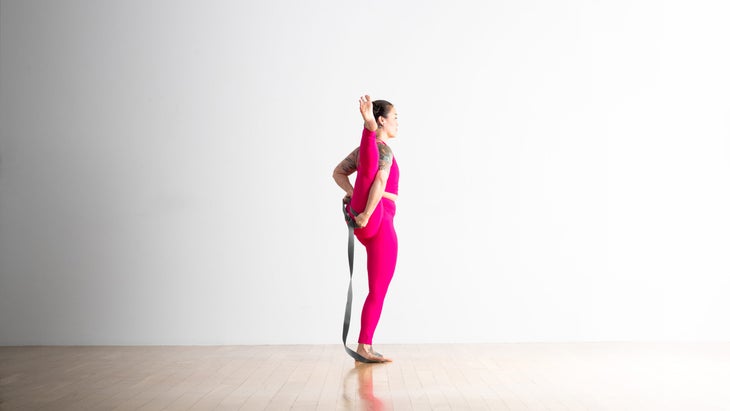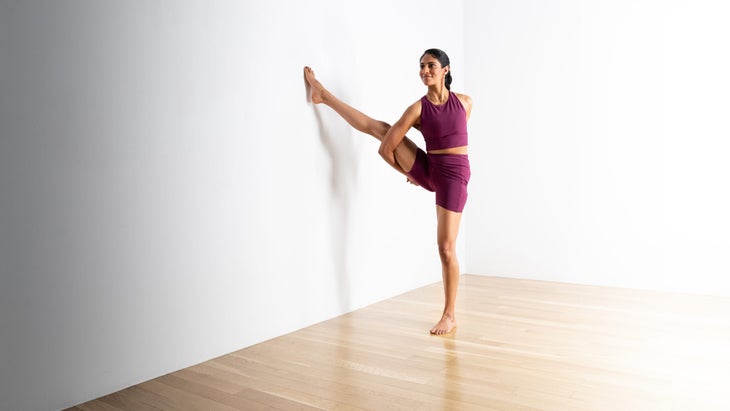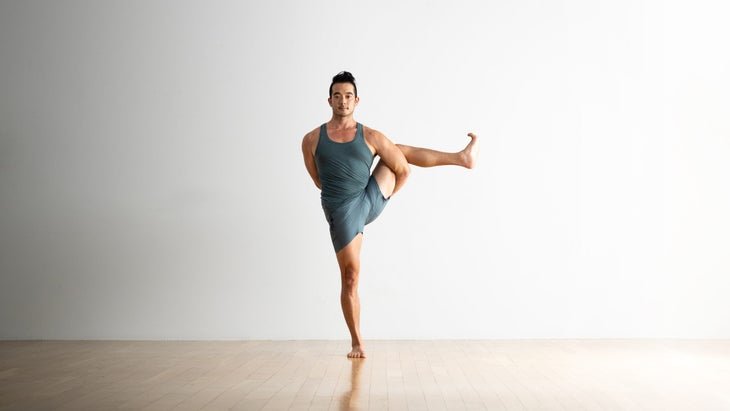“], “filter”: { “nextExceptions”: “img, blockquote, div”, “nextContainsExceptions”: “img, blockquote, a.btn, a.o-button”} }”>
Svarga Dvijasana (Bird of Paradise) is a challenging pose. Standing on one leg while extending the other demands flexibility, openness, balance, and strength. The key to practicing this pose is to take your time to work up to it, use props, and above all else, be gentle with yourself.
“Know that this pose is indeed challenging—physically and mentally—so do your best to relax your mind and expectations,” says yoga teacher Kathryn Budig, author of Aim True: Love Your Body, Eat Without Fear, Nourish Your Spirit, Discover True Balance! There’s nothing wrong with keeping your standing knee bent or using a yoga strap to help you extend the other leg. “Enjoy the bent-knee variation of the pose if your hip flexor and hamstrings aren’t ready; the full pose will come in due time.”
Bird of Paradise basics
Sanskrit: Svarga Dvijasana (SVAR-gah dwee-JAH-sah-nah)
Pose Type: Standing Balance
Targets: Lower Body
Why We Love It: “Emulating the beauty of the Bird of Paradise flower, this pose teaches me the resiliency a flower must have in order to bloom,” say frequent Yoga Journal contributor Jenny Clise. “A lesson I have learned is that not all beautiful things are born out of perfection. The road to this pose is not always paved with elegance or grace— it can get to be a messy journey at times, so we must pack our bags with enough patience and compassion to last. You can make more room for these qualities simply by releasing the heavy cargo of expectation. Some days, the proverbial flower will blossom, and others days we must tend to the bud. No matter where you arrive in this pose, you will gain strength, flexibility, and balance both physically and mentally.”
Access Yoga Journal’s Pose Library—which blends expert instruction from top teachers with video instruction, anatomy know-how, pose variations, and more—when you become a member today. It’s a resource you’ll return to again and again.
Pose benefits
Bird of Paradise strengthens your core and stretches around your shoulders, improving balance, body awareness, and posture. It can boost your energy and fight fatigue.
Bird of Paradise: Step-by-step instructions
- Begin in Extended Side Angle, with your left leg bent, your left arm reaching toward the floor, and your right arm reaching up.
- Bend your right elbow and reach your arm behind your back. With your left hand, reach through your legs and clasp your left hand or wrist. Press your shoulders back and open your chest.
- Pause and find a drishti point on the floor in front of you. Briefly shift your weight into your left foot, then step your right leg forward to meet the left, without losing the bind.
- Exhale and shift your weight into your left leg, finding balance as you press down through your foot.
- Slowly take weight off your right leg and start to lift your torso into an upright position. Allow the right knee to rise with the torso, hooked over your right arm, as you pull yourself up.
- Find outward rotation in your right hip and extend the lifted leg up and to the side.
- Once you are standing, lengthen your waist so that your torso is even on both sides. Open your chest and reach your sternum away from your navel.
- Push your right femur back so that the standing leg is straight.
- Hold for 5–10 breaths, then release. Pause before you repeat on the other side.
Beginners’ tip
Pull your shoulders back and avoid hunching forward.
Teaching Bird of Paradise Pose
These cues will help protect your students from injury and help them have the best experience of the pose:
- If the bind is difficult, use a strap. Hold it in your upward-reaching hand and allow it to drop down when you bend your elbow to reach behind your back. Grab the strap when you reach between your legs.
- Make sure that you are straightening your right leg and lifting your torso simultaneously.
- If taking your knee behind your shoulder or establishing a bind creates pain in your lower back or shoulder, practice the preparatory poses until your body is ready for Bird of Paradise.
Bird of Paradise Variations
Bird of Paradise Prep
Try staying in a bent-knee version of the pose. You can slowly try to straighten the knee without forcing it.
Bird of Paradise with a Strap

If you can’t quite clasp your hands behind your hip, use a strap to extend your reach.
Bird of Paradise at the Wall

If your challenge is balance, practice the pose near a wall. You can begin with your lifted leg bent, then walk your foot up the wall as your flexibility and balance increase.

